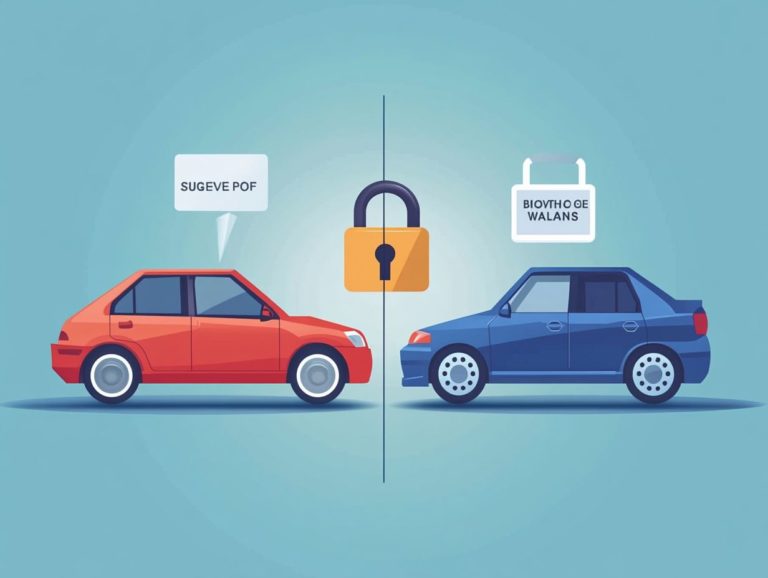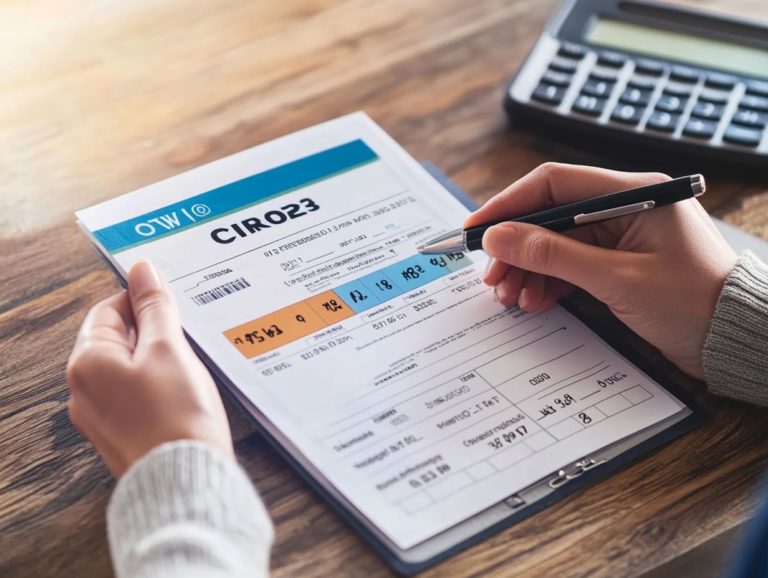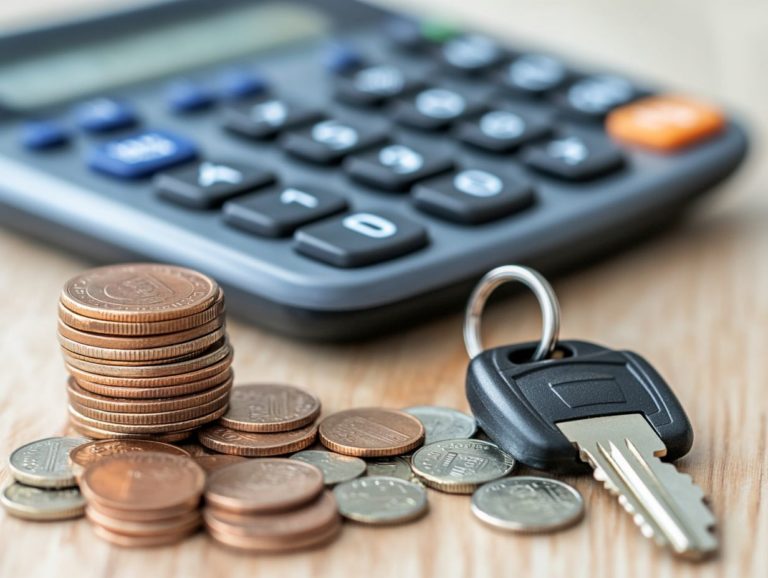How to Spot a Bad Car Financing Deal
Car financing can feel overwhelming, particularly with the multitude of options and potential pitfalls that await. It’s important to understand the types of financing available to make a smart choice.
This article will highlight the signs of a bad car financing deal. Look out for high interest rates and hidden fees, and understand their potential impacts on your finances and credit score.
Get ready to discover powerful tips that will help you land an unbeatable deal, ensuring that your car purchase transforms into a rewarding experience.
Continue reading to empower yourself and elevate your financial decision-making.
Contents
Key Takeaways:
- High interest rates are a major red flag in a car financing deal. Be wary of deals with rates significantly above the average for your credit score and the current market.
- Hidden fees and charges can greatly increase the overall cost of your car loan. Read and understand all terms and conditions before signing to avoid surprises down the road.
- Unfavorable loan terms, such as a long length of time to pay back the loan or a large down payment, can make a car financing deal unsustainable. Negotiate for better terms or consider alternative financing options.

Understanding Car Financing
Understanding car financing is essential for you as a potential car buyer. It encompasses various aspects, including dealership financing options, interest rates, and how your credit score affects your purchase.
By familiarizing yourself with financing programs, you empower yourself to make informed financial decisions that align with your budget and enhance your overall financial literacy.
With the right knowledge in hand, you’ll be well-prepared to navigate the intricacies of auto loans, including loan terms and monthly payments. This ultimately ensures a more favorable experience when it comes time to purchase your vehicle.
Types of Car Financing Options
When considering how to finance your vehicle, you ll find a variety of options at your disposal, including traditional auto loans, dealership financing, and credit unions. Each option has its advantages tailored to your financial situation.
Traditional auto loans are typically offered by banks or credit unions and often feature competitive interest rates, particularly if your credit is in good shape. However, you might encounter stricter eligibility requirements and a lengthier approval process.
Dealership financing offers convenience, allowing you to secure a loan right at the point of purchase. While this option may come with enticing promotional offers, be cautious interest rates might be higher, especially if your credit history isn’t glowing.
Credit unions can be an appealing alternative, frequently offering lower rates and more personalized service. Just keep in mind that membership requirements can sometimes restrict access, so it s crucial to weigh these factors carefully before making your decision.
Signs of a Bad Car Financing Deal

Recognizing the signs of a subpar car financing deal is crucial for you as a discerning car buyer. To make informed decisions, it’s important to know what to avoid in a used car deal. Poor financial choices can lead to lasting repercussions, including high interest rates, unfavorable loan terms, and those sneaky hidden fees that accumulate over time.
Taking the time to identify these warning signals can safeguard your financial future and ensure a more favorable purchasing experience.
Don t wait start your journey to a smarter car financing decision today!
High Interest Rates
High interest rates should raise a red flag for you when considering car financing deals. They can significantly inflate the overall cost of a less-than-ideal auto loan.
Often, these rates are tied to a lower credit score, which can lead to questionable financial choices. When you opt for financing with elevated interest rates, you not only face heftier monthly payments but also put your long-term financial stability at risk.
For instance, if you finance a $25,000 vehicle at a 15% interest rate over five years, you might find yourself paying nearly $7,000 in interest alone. This can drastically impact your budget and limit your ability to save for other essentials.
On the flip side, those who secure loans at lower rates can redirect more funds toward savings or investment opportunities, bolstering their financial health.
Several case studies underscore this notion:
- One family that took out a loan with an 18% rate struggled with monthly payments. They ultimately had to make sacrifices in other areas of their lives.
- In contrast, another family benefiting from a 5% rate was able to pay off their vehicle early and invest the surplus in their children’s education funds.
Your financial choices today can make or break your future! Stay alert about those interest rates.
Hidden Fees and Charges
Hidden fees and charges often lurk within loan agreements. It’s crucial for you, as a car buyer, to meticulously examine the fine print.
This diligence helps you avoid falling prey to finance markups and predatory lending practices. These concealed fees can encompass everything from administration fees to processing charges and other unexpected costs, significantly escalating the total amount payable over the life of the loan.
Many borrowers find themselves blindsided by these additional expenses, leading to financial strain later on. Talk to your lender now! It s crucial to uncover hidden fees before it s too late.
This proactive approach will illuminate any uncertainties and empower you to make informed decisions that steer clear of unpleasant surprises once the agreement is signed.
Unfavorable Loan Terms

Unfavorable loan terms can significantly impact your financial stability, especially if the repayment period stretches on indefinitely or if the loan includes fees for paying off the loan early.
These conditions can feel like a weight on your shoulders. They make it hard to manage your monthly expenses while constraining your options to refinance or pay off debts ahead of time.
Understanding the intricacies of these terms is essential for anyone aiming to navigate car ownership successfully. By staying informed, you can craft effective budgeting strategies that take into account both fixed payments and those pesky unexpected costs.
Recognizing how these unfavorable conditions interact with your personal finances can empower you to make smarter decisions, ultimately paving the way for a more sustainable financial future.
Consequences of a Bad Car Financing Deal
Entering into a bad car financing deal can have significant consequences for you. It can negatively impact your credit score and potentially lead to financial emergencies.
You may also face issues like negative equity and unexpected depreciation costs. All of which could hinder your ability to maintain vehicle ownership in the long run.
Impact on Credit Score
A poor car financing deal can significantly tarnish your credit score. This makes it increasingly difficult to obtain favorable terms on future loans, ultimately shaping your broader financial choices.
These unfavorable deals typically come with skyrocketing interest rates. These only serve to intensify your financial burden and heighten the risk of missed payments.
When you fall behind, the ensuing late fees and penalties can snowball into overwhelming debt, further jeopardizing your credit rating. For anyone facing these challenges, it s essential to take proactive steps to regain control.
Establishing a budget, making timely payments on existing debts, and even seeking credit counseling can gradually enhance your credit standing. Regularly monitoring your credit report allows you to track your progress and pinpoint areas that could use improvement.
Possible Legal Issues

Engaging in a subpar car financing deal can expose you to potential legal troubles. These include predatory lending practices and loan scams that complicate your financial landscape.
Understanding the details of car financing is essential. Many unsuspecting consumers find themselves caught in unfair practices that can lead to debt.
To protect yourself, read all documents carefully. Ask questions about any unclear terms, and compare offers from multiple lenders.
Reputable dealerships will be transparent about their fees. Stay aware and diligent to reduce your risk of falling victim to fraud. This will safeguard both your finances and your peace of mind.
How to Avoid a Bad Car Financing Deal
To steer clear of an unfavorable car financing deal, prioritize thorough research and comparison of available financing options.
Negotiate for better terms that align with your financial goals. Consider consulting with a financial advisor to ensure your budgeting strategies are sound.
This proactive approach empowers you to make informed decisions and secure the best possible deal.
Research and Compare Options
Conducting thorough research and comparing various car financing options empowers you to make informed financial decisions.
This process involves scrutinizing traditional banks as well as exploring credit unions and dealership financing. Since interest rates and loan terms can differ significantly, evaluate what each lender offers.
By leveraging consumer reports and utilizing online comparison tools, you gain valuable insights to navigate the complexities of car loans. Understanding these financing methods could ultimately lead to substantial savings over time.
Negotiate for Better Terms
Negotiating for better loan terms is pivotal in securing financing that works for you. This could lower your interest rates and achieve monthly payments that align seamlessly with your financial aspirations.
This journey begins with diligent research into current market rates and the variety of financing options available, empowering you to enter dealerships with confidence.
Armed with this knowledge, articulate your needs effectively, making it easier to counter the initial offers presented by lenders.
For instance, if you know that the average interest rate for your credit score bracket hovers around 4%, you can use that insight to negotiate a rate closer to that benchmark. Additionally, showcasing your ability to make a substantial down payment encourages dealers to present more favorable terms.
Consult with a Financial Advisor
A financial advisor provides key insights into budgeting strategies. This support helps you make sound financial decisions for sustainable car ownership.
In today s complex financial world, the expertise of a financial advisor can guide you through the maze of financing options available for vehicle purchases.
This professional support clarifies loan terms, interest rates, and monthly payments. It also gives you the power to create a realistic budget tailored to your unique financial situation.
By evaluating your overall financial health, a financial advisor ensures your choice is not just affordable in the short term but also advantageous in the long run.
Knowledgeable guidance boosts your financial literacy, enabling you to make informed decisions that lead to greater financial stability and peace of mind throughout your car ownership journey.
Frequently Asked Questions
What is a bad car financing deal?
A bad car financing deal has unfavorable loan terms.
How can I spot a bad car financing deal? Watch for excessive fees, high interest rates, and lack of transparency regarding loan terms. For those with less-than-perfect credit, consider these tips for financing a car with bad credit.
What are some warning signs to look out for?
Be cautious of loans with high annual percentage rates (APR), prepayment penalties, and variable interest rates. Also, watch for lenders who pressure you to sign quickly or are not transparent about the loan details.
What are some common mistakes people make when securing a car financing deal?
A common mistake is not shopping around for different loan options. Another mistake is not fully understanding the loan terms and signing the contract blindly.
How can I protect myself from getting a bad car financing deal?
Before signing any loan agreement, thoroughly research the lender and understand all terms. It’s also important to compare offers from multiple lenders to find the best deal for you.
What should I do if I suspect I’ve signed a bad car financing deal?
If you believe your deal is unfavorable, try negotiating with the lender for better terms. If that fails, you may need to refinance the loan or seek legal advice.
Ready to find your best financing option? Start your journey today!






